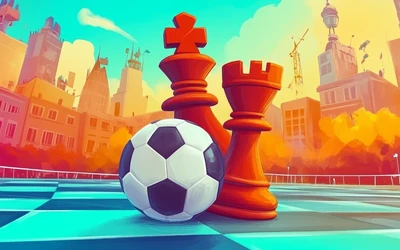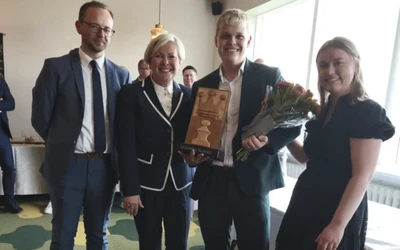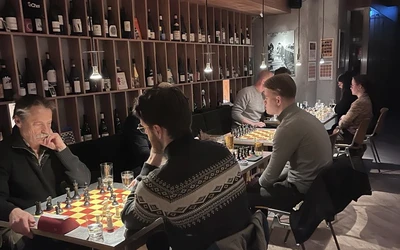
FIDE
Interview with GM Volodar Murzin - World Rapid Champion 2024
Dear Volodar!
1) Congratulations on your victory at the FIDE World Rapid Chess Championship. In this competition, you defeated stars such as Fabiano Caruana, Hikaru Nakamura, Jan-Krzysztof Duda, and Praggnanandha Rameshbabu. Did you expect such a success at the start of the tournament?
Volodar: Thanks for your congratulations!
Last year, I tied for third place (I was fifth based on the final score), so I was hoping to play well. Although I was aware of the significant time difference between New York and Moscow (eight hours), I assessed my chances soberly.
2) How did you prepare for the tournament?
Volodar: I tried to approach the tournament well prepared: I solved problems with my coach (Mikhail Kobalia), played practice games, and studied openings.
I also adjusted my daily routine to match American rounds, as the rounds there started at 10:00 PM Moscow time.
3) How does it feel to be the second-youngest rapid chess world champion in history (after Abdusattorov)?
Volodar: Honestly, I wanted to be the youngest world champion!
4) You're 18 now. At what age did you start playing chess?
Volodar: At seven and a half, I joined a chess club, but I wasn't accepted right away—I didn't know how chess pieces moved. So I played at my grandfather's house for six months, and it took me two attempts to get in.

Volodar won Round 10 of the FIDE World Rapid Championship against GM Jan-Krzyzstof Duda (Picture: FIDE)
5) What is your next goal in your chess career?
Volodar: Becoming World Champion in classical chess is the most important title.
6) What are your strengths and weaknesses in chess?
Volodar: My strengths include tactical vision, imagination, and ingenuity. My relative weakness is the opening; there is room for improvement.
7) Do you follow any particular rituals or habits to prepare for a match?
Volodar: Chess players usually try not to talk about it, so as not to scare away their luck. But in general, I don't have any particular rituals.
8) How do you deal with defeats in chess?
Volodar: It depends on the game. As a child, I could have cried after a disappointing loss, but now I control myself and try not to show any emotion in public. But of course, every defeat is unpleasant, so you want to recover quickly.
https://www.youtube.com/watch?v=nZN9vkQ7ng8
Crying after losing is not always bad | Ft. Volodar Murzin at World Blitz 2019 by ChessBase India
9) What's the most unusual thing that's happened to you during a chess event?
Volodar: At a tournament in Yakutia, Russian grandmaster Dmitry Kryakvin fell asleep during a game. The organizers had to wake him up several times, given the harsh winter conditions in Yakutia. At the same tournament, my coach Mikhail Kobalia and I played a blitz game outdoors in minus 50 degrees Celsius (-50 degrees Fahrenheit) and made it into the world record books!
10) Which former or current chess players do you admire most?
Volodar: Robert "Bobby" Fischer.

Sensational performance by Volodar who went on to win undefeated (!)
11) Is there a famous chess game that inspired you as a child?
Volodar: Garry Kasparov's game against Veselin Topalov with a rook sacrifice.
12) What are your interests outside of chess?
Volodar: Whenever possible, I try to play soccer, beach volleyball, and table tennis.
13) What advice would you give our readers if they want to make major improvements?
Opening: Read chess books, listen to the advice of mentors. Don't be afraid to try something new, as it will broaden your chess horizons.
Middlegame: Analyze your own games and pay attention to mistakes. It is useful to study the legacy of world champions and great chess players of the past. Furthermore, it is important to practice various aspects of positional play and tactical foresight.
Endgame: Here, I would pay more attention to books on endgames, especially the legacy of Mark Dvoretsky. This is like an introduction for all chess players. Without studying it, it will be impossible to progress in endgame technique.

Note that this article was first published originally in German in the March 2025 issue of the German chess magazine Rochade Europa).
You may also like
 FM MathiCasa
FM MathiCasaChess Football: A Fun and Creative Variant
Where chess pieces become "players" and the traditional chessboard turns into a soccer field FM jeffforever
FM jeffforeverInterview with GM Vignir Vatnar Stefansson - 2x Icelandic Chess Champion
Get to know the 22-year-old GM, whose great-great-grandfather became the first Icelandic Champion! FM jeffforever
FM jeffforeverChess in the Capital: Visiting Svarta Hästen & Stockholm Chess Federation
A visit to the famous Svarta Hästen Schack & Vin bar and Stockholm Chess Federation FM jeffforever
FM jeffforeverInterview with "The Beast" GM Adhiban Baskaran
Get to know the "Adhiban Gambit" founder ebk1976
ebk1976